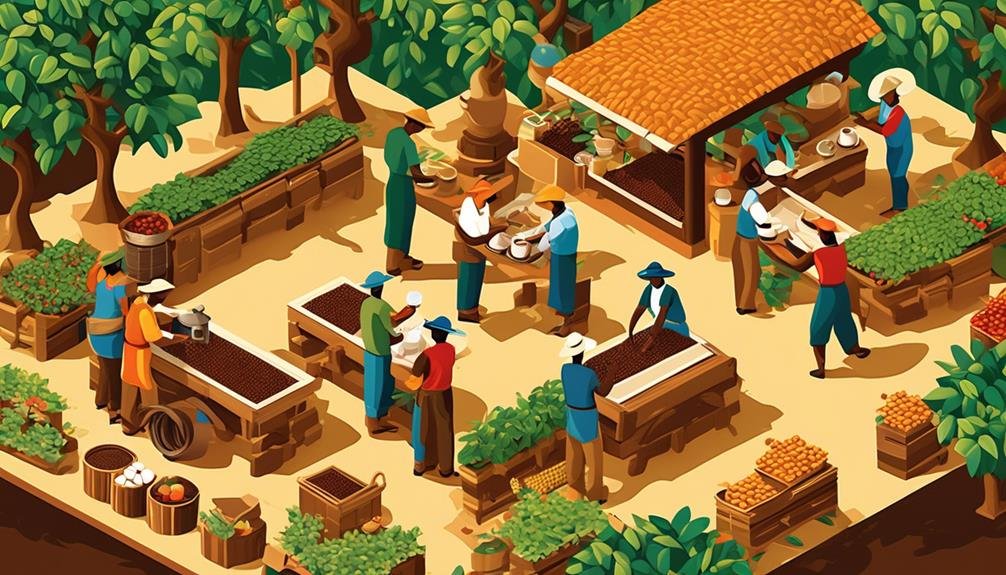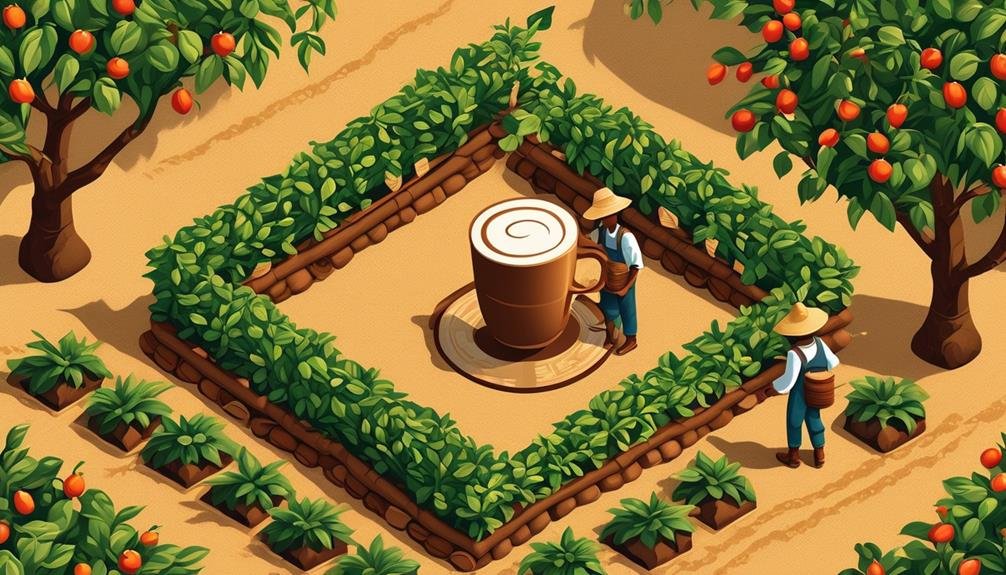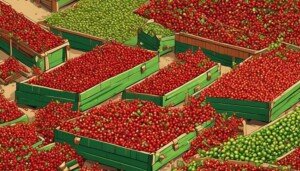Did you know that the global fair trade market has grown by 10% annually over the past decade? This statistic highlights the increasing consumer demand for ethical and sustainable products, including coffee.
If you've ever wondered what the fair trade and organic coffee labels really mean, you're in the right place. In this discussion, we will explore the certifications behind these labels, understand their significance in promoting fair prices for farmers and sustainable farming practices, and discover how they enable consumers to make informed choices.
So, grab your favorite mug of coffee and let's dive into the world of fair trade and organic coffee labels.
Key Takeaways
- Fair Trade Certified labels guarantee fair prices for farmers and workers, ensuring ethical sourcing and closely monitored supply chains.
- Fair for Life certification focuses on fostering fair and positive relations throughout the production process, supporting sustainable and ethical practices.
- Certified organic coffee labels indicate coffee produced using organic farming practices, supporting environmentally friendly and sustainable agricultural practices.
- Labels for Fair Trade Certified products help consumers identify fair trade products, promoting consumer awareness and supporting fair and sustainable practices on coffee plantations.
Understanding Fair Trade Certifications
Have you ever wondered what it means for a product to be labeled as Fair Trade Certified? The Fair Trade Certified label ensures that the product you're purchasing has been produced and traded in a way that aligns with fair trade principles. This certification guarantees that small farmers and workers receive fair prices for their products and are able to improve their livelihoods.
When it comes to coffee beans, the Fair Trade Certified label means that the beans have been sourced from farmers who are part of a fair trade cooperative. These farmers are paid a fair price for their beans, which helps to provide them with a stable income and support their communities. In addition to fair prices, the Fair Trade Certified label also ensures that the coffee beans have been ethically sourced.
The supply chain for Fair Trade Certified coffee beans is closely monitored to ensure that there's transparency and accountability at every stage of production. This means that consumers can trust that the coffee they're buying has been produced in a way that's socially and environmentally responsible.
Fairtrade International is the organization that oversees the Fairtrade certification process. They set the standards that must be met in order for a product to be labeled as Fair Trade Certified. Additionally, Fair Trade USA has its own standards and carries out certifications through SCS Global Services.
Exploring Fair Trade International
Fair Trade International, a network of organizations in 24 countries, aims to connect disadvantaged producers and consumers through the certification of over 27,000 products carrying the Fairtrade mark. This certification ensures that the products meet specific social, economic, and environmental standards.
- Fair Trade International certifies a wide range of products, primarily food items like coffee, tea, chocolate, bananas, and rice. These products are produced by farmers who are paid fair prices and work in safe conditions.
- Fair Trade USA is a separate organization that certifies products such as apparel, grains, body care, cocoa, and coffee. They have their own standards and compliance criteria.
- Fair for Life is another certification that focuses on fair and positive relations throughout the entire supply chain. It covers both non-food and food commodities and places emphasis on producers, manufacturers, and traders.
- The Fair Trade Certified Labels are found on commodities grown at the farm level. They certify products like coffee, chocolate, fruits, rice, and cotton. However, they don't monitor the supply chain for handcrafted products.
- The Institute for Marketecology (IMO) is an independent certifier specializing in international inspection and certification services. They focus on organic, ecological, and social standards.
The Mission of Fair for Life

As we continue our exploration of Fair Trade International, it is important to understand the mission of Fair for Life, a certification system that aims to foster fair and positive relations throughout the entire production process. Fair for Life's certification system covers both non-food and food commodities, ensuring that every step of production can be certified. Unlike other fair trade movements, Fair for Life focuses on producers, manufacturers, and traders, rather than being specific to certain products. The mission of Fair for Life is to create a positive impact by promoting fair and ethical relations in the fair trade landscape.
To emphasize the versatility of Fair for Life's certification process, let's take a look at a table comparing Fair for Life with other fair trade certifications:
| Certification | Focus | Products Covered | Governance Structure |
|---|---|---|---|
| Fair for Life | Producers, manufacturers, traders | Wide range | Participatory governance |
| Fair Trade U.S.A | Producers | Specific products | Independent certification |
| Fair Trade Federation | Producers, consumers | Specific products | Member-owned network |
As you can see, Fair for Life does not limit itself to specific products, making it versatile for a wide range of commodities. It also stands out with its participatory governance structure, which ensures that all stakeholders have a say in the decision-making process.
Unraveling the Fair Trade Coffee Label
To understand the complexity of the fair trade coffee label, it's important to delve into its intricacies and unravel its many layers. Fair trade labels aim to ensure fair cost, connect disadvantaged producers with consumers, and provide certifications for various products, including coffee. Here's a breakdown of the fair trade coffee label:
- Certification: Fair trade certification ensures that coffee products meet specific standards regarding fair trade practices. This certification is granted by organizations like Fairtrade International, Fair Trade USA, and Fair for Life.
- Focus: The fair trade coffee label focuses on supporting farmers by guaranteeing fair prices, providing Fairtrade premiums that can be invested in community development, and promoting sustainable farming practices.
- Supply Chains: The label also ensures that the coffee supply chains are transparent and accountable. This means that the entire process, from the farm to the consumer, is monitored to ensure ethical practices and fair treatment of workers.
- Benefits: By purchasing coffee with the fair trade label, consumers can feel confident that they're supporting farmers and communities in developing countries. It's an easy way to make a positive impact through their coffee choices.
Decoding Sustainable Coffee Labels

Understanding the intricacies of fair trade coffee labels leads us to the next important topic: decoding sustainable coffee labels. While Fairtrade certification ensures fair cost, sustainability, and ethical treatment of workers, there are other labels that focus specifically on the sustainability aspect of coffee production.
One important label to look for is the certified organic label. This indicates that the coffee has been produced using organic farming practices, without the use of synthetic pesticides or fertilizers. By choosing certified organic coffee, you're supporting environmentally friendly practices and reducing the negative impact of conventional farming on ecosystems.
Another label to consider is shade-grown coffee. Shade-grown coffee is grown under a canopy of trees, which provides habitat for birds and other wildlife. This helps to preserve biodiversity and prevent deforestation. By choosing shade-grown coffee, you're supporting sustainable agricultural practices and protecting important ecosystems.
It's also worth noting that some coffee labels go beyond minimum standards and prioritize the well-being of farmers and workers. These labels often require higher wages, better working conditions, and support for community development projects. Look for labels that carry the Fairtrade mark, as they ensure that farmers and workers are receiving a fair price for their coffee and are part of a transparent supply chain.
Exploring Organic Coffee Certifications
When exploring organic coffee certifications, it's important to understand the various labels and standards that ensure the coffee has been produced using organic farming practices. Here are some key points to consider:
- Fairtrade Certification: Fairtrade International and Fair Trade USA certify coffee and other products to ensure fair cost and community empowerment. They've their own standards and compliance criteria for sustainable development.
- Fair for Life: This certification focuses on fair and positive relations at every step of production, certifying both food and non-food commodities. It emphasizes sustainable and ethical practices.
- Certified Organic: The term 'certified organic' refers to coffee that has been grown and monitored at the farm level according to organic farming practices. The Institute for Marketecology (IMO) specializes in international inspection and certification services for organic, ecological, and social standards.
- Labels: Multiple labels exist for Fair Trade Certified products, including coffee. These labels distinguish commodities that meet specific fair trade criteria.
Understanding these certifications and labels can help you make informed choices when purchasing organic coffee. By supporting certified coffee, you contribute to fair and sustainable practices on coffee plantations worldwide.
Frequently Asked Questions
What Does Fairtrade Coffee Label Mean?
The Fairtrade coffee label means that the coffee you're buying has been produced and traded in a way that guarantees fair prices for farmers, sustainable farming practices, and better working conditions.
What Is Organic Fairtrade Coffee?
Organic fairtrade coffee is coffee that is grown without synthetic fertilizers and pesticides and is certified by the Fairtrade Mark, ensuring fair prices to farmers and supporting sustainable farming practices and community development projects.
How Can You Tell if Coffee Is Fairtrade?
You can tell if coffee is fair trade by looking for the Fairtrade Mark or the Fair for Life certification. These labels ensure that the coffee was produced under fair and ethical conditions, benefiting farmers and workers.
What Are the Main Types of Fairtrade Coffee?
Fairtrade coffee labels include Fair Trade International, Fair Trade USA, and Fair for Life. These labels certify coffee that meets fair and positive relation standards between producers and consumers.
Conclusion
In conclusion, the fair trade and organic coffee labels play a crucial role in ensuring ethical and sustainable practices in the coffee industry.
These certifications guarantee fair prices for farmers, community development, and the use of environmentally friendly farming methods.
By choosing coffee with these labels, consumers can support fair and sustainable coffee production, promoting a healthier planet and better livelihoods for coffee farmers around the world.




